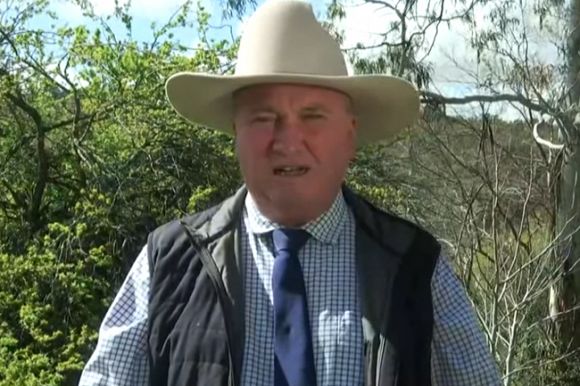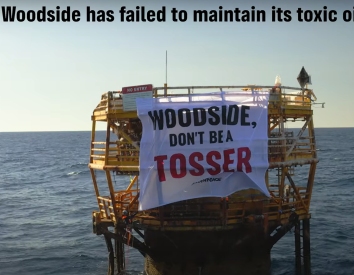Extreme weather seen in Western Australia sends us an unequivocal message that governments and corporations must address the climate crisis, writes Greenpeace Australia Pacific CEO David Ritter.
AS A Western Australian kid who now lives in Sydney, I spent the "black summer" of 2019-2020 inhaling the smoke from the fires that devastated our eastern seaboard. But this summer, while it has been pretty wet in the "Emerald City", things have been very different in my home state.
Western Australia has been an inferno. Historically, we sandgropers always took a bit of perverse pride in the heat of the place, but global warming is taking the temperature off the dial of what we have ever experienced before.
The temperature exceeded fifty degrees in the Pilbara in mid-January, matching the hottest temperatures ever recorded in Australia. Perth has had a record 11 days above forty degrees, including six in a row. The unprecedented heat is driving catastrophic fire conditions, leading to the terrifying blazes of the last few weeks.
As anyone who’s spent time in WA knows, the locations that have burned or been threatened include precious places of extraordinary natural beauty and magnificent wildlife, and small towns with tight-knit communities.
As always, it is right to give great thanks to the frontline emergency service workers who are facing the fires, and to all who are doing the work of love and care in the aftermath.
WA has always had bushfires. The valley I lived in until I was ten years old was burned through a couple of times while my parents lived there. Like all the kids who lived on the rural-urban fringe, I was brought up with a healthy respect for fire safety and knew the value of a damp hessian sack. At the local school, Colin Thiele’s February Dragon was compulsory reading.
But frightening as the threat of fire was in those distant days of the 1970s, today’s fires are of a different order of destructiveness.
According to Great Southern District Department of Fire and Emergency Services (DFES) Superintendent Wayne Green, who has spent recent days dealing with the chaos, he’s 'seen the change in our fire behaviour over the last few years' and there is no doubt that it has been exacerbated by climate change.
Earlier in the season, WA’s DFES Commissioner, Darren Klemm, had already gone on record to say that the frequency and intensity of weather events in the state were the result of climate change.
The top WA firies are just adding their voices to the choir of frontline fire and emergency chiefs who have been sounding the alarm for years. I’ve just finished reading Greg Mullins’ terrific memoir, Firestorm: Battling Super-Charged Natural Disasters, which lays out in clear, determined, unsentimental detail, the awakening that he and other senior leaders in the fire and rescue community have had in relation to the severe fire risks brought on by climate change.
Mullins is unequivocal:
I know fire. I’ve been involved in some way in just about every major bushfire event in NSW for decades, and helped coordinate responses to many interstate bushfire emergencies such as Black Saturday in 2009.
I can tell you with absolute certainty on the basis of my personal observations and on the basis of unchallengeable scientific data and research findings that our climate is changing. Humanity is responsible… resulting in more frequent natural disasters, increasingly on a scale beyond our ability to manage or control.
Mullins is also clear about what is needed: far greater resources to respond to the frequency and scale of the climate change disasters and very rapid cuts to emissions that are primarily driven by the burning of coal, oil and gas.
Without this dual approach, no amount of additional emergency response resourcing will be able to keep communities safe. Emissions action is the only measure that has a chance of eventually stabilising, then reducing, the escalating risks and impacts.
Western Australians are known for manifesting a certain reflexive sense of grievance at Canberra, but in relation to the Federal Government’s dismal performance on climate change, the frustration is fully justified.
Scott Morrison’s government has no credible plan to reduce emissions, consistent with what is required to limit global warming and with the internationally agreed Paris climate goals. Similarly, federal investments in disaster response have been inadequate and laggardly.
A full year on from the devastating Black Summer bushfires, in February 2021, a report found less than half of promised bushfire recovery funds had been provided to surviving communities.
On the other hand, in Western Australia itself, fossil fuel giant Woodside threatens to unleash vast new emissions through its mammoth Scarborough gas project.
As the most climate-polluting project ever proposed in Australia, this would absolutely make an oversized contribution to worsening climate change, as well as drive disastrous consequences for the surrounding pristine marine environment.
Western Australia, one of the sunniest, windiest places on earth, stands to gain so much from a swift transition to a solar and wind-powered energy system, and, conversely, faces increasingly graver threats from climate change, unless action is taken to reduce emissions.
Our ambition should be to create the conditions for our shared future flourishing, not a future of fire.
David Ritter is Chief Executive Officer of Greenpeace Australia Pacific. You can follow David on Twitter @David_Ritter.
Related Articles
- People are prepared to vote for stronger climate policies
- Voters in battleground states support a green transition
- Climate change must inform every financial decision
- Wealthy nations like Australia are leading the world to climate catastrophe
- Morrison Government continues to trash Australia's reputation on climate
 This work is licensed under a Creative Commons Attribution-NonCommercial-NoDerivs 3.0 Australia License
This work is licensed under a Creative Commons Attribution-NonCommercial-NoDerivs 3.0 Australia License
Support independent journalism Subscribe to IA.















